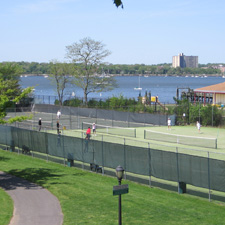
The Village of Great Neck Estates is expanding and upgrading indoor tennis facilities at Great Neck Estates Waterfront Park, courtesy of New York Tennis, Inc., in a deal that will net the village $1.1 million over 10 years, said Village of Great Neck Estates Deputy Mayor William Warner.
“It’s going to be a state-of-the-art, world-class, indoor tennis facility,” Warner said. “We get our infrastructure upgraded on someone else’s dime.”
The park currently features four year-round, artificial grass courts and three Har-Tru courts protected by a bubble Sept. 15 to May 1.
In return for running the village’s indoor tennis program, New York Tennis will convert two grass courts to Har-Tru, install a new bubble, and renovate the attached pavilion in a $250,000 upgrade.
Facilities will be owned by the village and maintained by New York Tennis. The 10-year contract can be terminated at will.
At a trustee meeting July 11, more than 50 residents packed Village Hall to learn more about the vendor. Some expressed trepidation about a deal that seemed too good to be true.
Warner said New York Tennis runs facilities for the City of New York with the same termination clause.
“The one thing I can attest to is it’s a quality outfit,” said local resident Andy West. “It’s unusual in this day and age to have something in the budget that’s a revenue producer.”
While Great Neck Estates residents will have first preference on indoor courts and a 10 percent discount, they will be open to the public. Warner said half the court times are booked by residents from outside Great Neck Estates.
Trustees said they hope the renovation will bring more residents back to Great Neck Estates Park.
They also said the impact on traffic will be negligible and buses are prohibited.
Despite reassurances from trustees, some residents were concerned about their property value and “outsiders” hanging out in the park.
“We pay a lot of taxes,” said one Great Neck Estates resident. “We don’t want to open it up to the rest of Queens, or Brooklyn, or whatever.”
Trustees defended their decision, saying that tennis players are great people and the local police force will continue to monitor the park.
New York Tennis Coach Howie Arons said he will market the facility to Great Neck residents. His program at Cunningham Park is 70 percent Great Neck residents, while the Shelter Rock tennis camp is entirely Great Neck residents.
The contract was 20 months in the making and prompted by the need for a new bubble. Warner said the 12-year-old bubble would cost approximately $600,000 to replace, an unacceptably high cost in a time of shrinking revenue.
“The way we’re doing the business hasn’t changed at all,” he said.
For the past 25 years, a vendor has paid village officials to run the tennis program. This time, he said the village is getting a better contract.
The construction schedule is currently under discussion.
“We are trying to get up and running for the season as soon as possible,” Warner said. “I doubt it will be Sept. 15, but we’ll try.”
Trustees also heard a presentation from the Green Towers Group, a private company that builds cell-phone towers that it rents to cell phone providers.
Nathaniel Lamson, wireless infrastructure developer from Green Towers Group, proposed a 150-foot, 4G cell phone tower that would be sited on the village’s Department of Public Works headquarters.
It would be 42 inches at the base and taper slightly towards the top. All infrastructure would be hidden inside the tower.
He said the tower would be visible to one or two neighboring houses and the waterfront park. To test the visual impact, Lamson said a crane could be brought into the village for a couple of hours.
“It’s just a proposition for you,” he said. “I know it won’t be easy if they were worried about a bubble.”
He said it could net the village $100,000 per year for 30 years.
The company built towers in Manhasset and the villages of Thomaston, Flower Hill, and Babylon. Thomaston features a 125-foot cell phone tower on East Shore Road. They currently receive $2,500 per month for the pole, which he said should increase to $4,500 per month in a few years.
Trustees were noncommittal.
“If we are interested, we will hear more,” Warner said.






